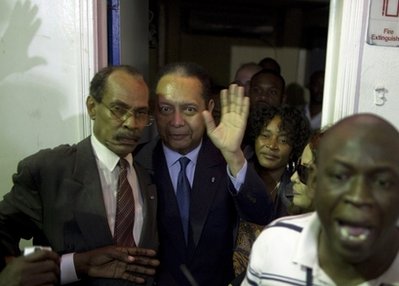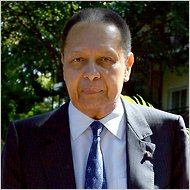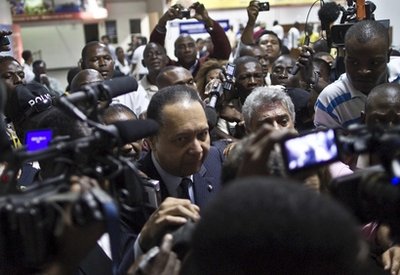MEXICO CITY — Haiti’s exiled former dictator, Jean-Claude Duvalier, returned unexpectedly to his homeland Sunday for the first time since he was deposed in a coup in 1986.
Related
-
Haiti Weighs Move After Observers Reject Vote Results (January 15, 2011)
-
Times Topic: Haiti
Related in Opinion
-
The Dechoukaj This Time (February 7, 2010)
Although the reason was not immediately clear, his return, reported by news agencies and radio stations in Haiti, appeared to take the Haitian government completely by surprise.
 |
|
Haiti's former dictator Jean-Claude 'Baby-Doc' Duvalier, center, waves to the media upon his arrival to the Toussaint Louverture international airport in Port-au-Prince, Haiti, Sunday Jan. 16, 2011. Duvalier returned to Haiti after nearly 25 years in exile, a surprising and perplexing move that comes as his country struggles with a political crisis and the stalled effort to recover from last year's devastating earthquake.»(AP Photo/Ramon Espinosa) |
He returned as Haiti remains in a political crisis over a disputed election last fall and the country continues to recover from a devastating earthquake a year ago last week.
Mr. Duvalier, known as “Baby Doc,” had ruled Haiti after the 1971 death of his father, the authoritarian François Duvalier, known as “Papa Doc.” The son had been living in France in exile.
Reuters reported that he was met at the airport in Port-au-Prince by enthusiastic supporters.
|
Earlier Sunday, the American ambassador to Haiti embraced an international report rejecting the results of the presidential election in November, adding pressure on Haitian officials to reconsider the outcome.
The ambassador, Kenneth H. Merten, said in a telephone interview that the report “makes sense,” and he urged Haitian officials to accept its findings, including the conclusion of widespread fraud.
The report, delivered Thursday to President René Préval and prepared by a multinational team of experts convened by the Organization of American States, confirmed Mirland Manigat, a former first lady, as the leader in the first round of voting in November. She did not win enough votes to avoid a runoff, though.
But the report said, based on a statistical analysis of ballot sheets, that Mr. Préval’s choice as his successor, Jude Célestin, had placed third, not second, as announced when the initial results were released in early December. Instead, the panel said Michel Martelly, a popular singer, had won second place and qualified to face Ms. Manigat in the second round of balloting..
Mr. Préval has not commented on the report, but his aides have been privately telling reporters that he is dissatisfied with it and questions its methodology.
With the leadership of the country and billions of dollars of disaster relief hanging in the balance, José Miguel Inzula, the O.A.S. secretary general, plans to visit Haiti Monday to consult with top officials.
Mr. Merten, who also spoke Sunday to two Haitian radio stations, noted that Mr. Préval had asked for the report in an effort to defuse a political crisis that had lead to violent demonstrations when the initial results were announced.
“The report is something we all in the international community think makes sense,” said Mr. Merten, who met Saturday with several other ambassadors.
“It would be problematic,” he added, “if the Haitians sought to modify the contents of the report Préval asked for. It is a technical report, prepared by a multinational team of experts.”
Their qualifications, he added, “are pretty impeccable.”
Mr. Merten declined to discuss what steps, if any, the United States would take if the government rejected the report or the votes were not retabulated.
The second round of voting had been scheduled for Sunday but was postponed while the O.A.S. conducted its review. Haitian authorities have said the runoff probably will not now occur until February.
Sporadic political violence has broken out since December. On Friday a man was shot to death during a confrontation with the police at a demonstration.
Several diplomats have said they are growing worried that the delay in resolving the election could ignite more violence.
“It seems like a balloon that keeps getting air put into it,” said one. “It would be wise to let the air out before the balloon bursts.”



